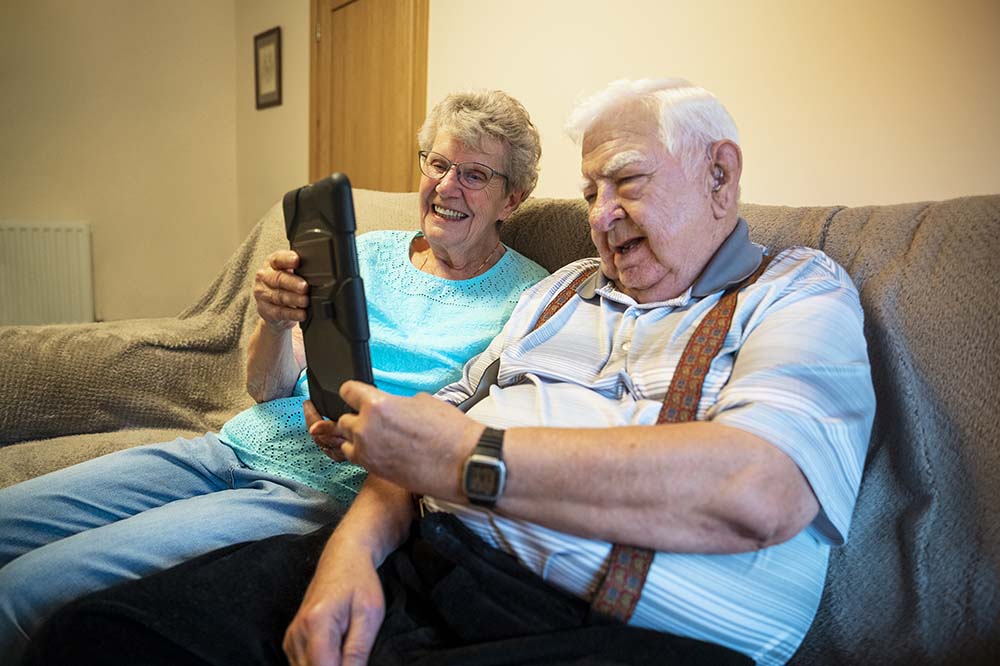How to choose the best alarm for yourself
Find the best alarm for yourself or someone you care about. Our guide tells you everything you need to know, from the best service providers to how much you should spend and the most important things to look out for.
People with personal alarms can call for help if they have an accident or fall at home. They are easy to use and can make older or less-abled people feel safer and help them stay on their own longer. These devices, which could save lives, can also give family and friends peace of mind.
There are many different kinds of personal alarms, and each one keeps people safe in a slightly different way. Some are linked to emergency response centres that are open 24 hours a day, 7 days a week, while others just make a loud noise to warn people nearby.
We don’t test personal alarms, but we have a lot of helpful buying tips that can help you make a choice. Keep reading to learn about the different kinds of personal alarms, how much they cost, where you can buy them, and more.
Types of personal alarms
Basic alarm
Basic alarms work by making a loud noise when you press a button on the device. This lets people who can hear it know that you need help. This person could be a family member, a caretaker, or even a neighbour. Even though the system is simple, it can help you move around your home on your own, knowing that if you need help, someone will be there.
Pros
- Affordable. There are no setup costs or monthly fees, and it’s ready to use right away.
Cons:
- The only people who can help are those who can hear the alarm.
- No contact centre support.
Pendant alarm
Pendant alarms connect the elderly and other people who might need help to an emergency response centre. By pressing a button on the pendant, watch, or other device, the base unit in your home sends a signal to an emergency response centre. The centre keeps an eye on things around the clock and is ready to help with anything from falls and accidents to strange callers. When you call the staff, they’ll figure out if you need emergency services or if they need to call one of the trusted people you’ve chosen. There are a few companies that offer this service, which usually costs a monthly or yearly fee plus an initial setup fee.
The monthly fee depends on the type of service. For example, if you need a wider alert range, you can expect to pay more. Some pendant alarms let you talk directly through the device, while others require you to use the base unit.
Pros:
- You can choose from different subscriptions and options to meet your needs.
• Help for emergencies around the clock.
• Some models can be used to make direct contact.
Cons
- Some of the poorest people may not be able to pay for the service. There may be a one-time fee to set up the service.
- Fall detectors
As people get older, they are more likely to trip and fall, which can lead to more serious injuries. With a fall alarm, you can be sure that if you do fall, help will be there as soon as possible. The main difference between a fall alarm and a pendant alarm is that a fall alarm works on its own. It has a built-in motion sensor that sends an alert to a call centre or a loved one if the person falls or moves down unexpectedly. Some models have a two-way speaker on the device or base unit that lets you talk directly to the call centre. People pay for fall detectors as part of a monthly subscription, and they also have to pay an installation fee to get them up and running. There are many models that include both a fall alarm and a pendant alarm in one device.
Pros:
- The devices work on their own, and there is emergency coverage 24 hours a day, 7 days a week.
Cons:
- The service can be pricey, and there may be a one-time setup fee.
Lifeline alarms
Local governments and councils run what is sometimes called a “lifeline alarm service” for their elderly and disabled residents. There is a fee to use the service, but it may be free or subsidised for people whose needs are deemed to be eligible. Those who sign up will get a base unit and a pendant, and the council will usually not charge for installation.
Pros:
- The service is provided by the local government.
- Some councils will install and check your system for free.
Cons:
- You have to pay a monthly or yearly fee.
- Tracking by GPS
GPS tracking Alarms
GPS tracking alarms make it possible to find the location of elderly or vulnerable people when they are away from home. Some pendant alarms have a limited range, but GPS tracking alarms don’t care where they are and can be used anywhere. Most GPS trackers also have a “SOS” or “panic” button that users can press to get help from a team that is watching them 24 hours a day. This team will then call family members or emergency services. Some GPS trackers let people talk to people at a contact centre. A setup fee and a monthly fee are needed for GPS tracking services.
Pros:
- People can be found no matter where they are in the world. • GPS trackers have an SOS or panic button.
Cons:
- You have to pay a monthly or yearly fee to use the service.

